Category: International
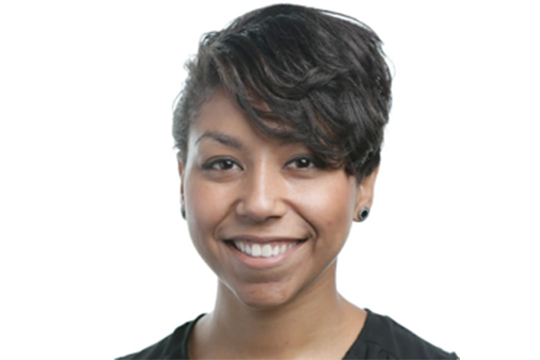
Returning to Guatemala
By Alicia Robinson, ’11 (International Relations)
I came to Stanford after spending most of my life living in Guatemala, where my mother worked for the United Nations. As an international relations major, my focus was on human rights and international law. As a sophomore, I obtained the Stanford Human Rights fellowship to work for UNICEF in Cairo. I was a member of the Stanford Rotaract Club, where I organized a service trip to Guatemala and also co-founded the Central American Students Association to raise awareness on campus about the socio-political realities of this region. I subsequently pursued my JD at Harvard Law School, where I continued to study human rights and post-conflict peace-building. I decided to return to Guatemala to contribute to efforts to curtail impunity, which has severely affected the country’s overall stability in recent years.
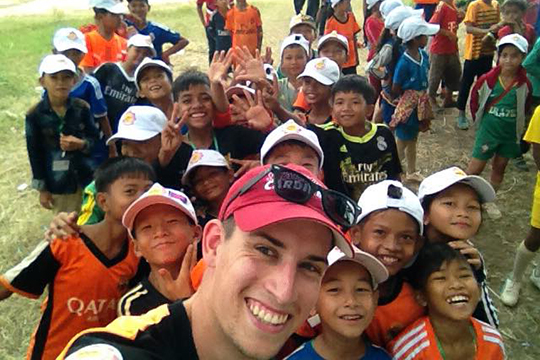
Using sport to engage youth
By Eric Fabre, ’16 (International Relations)
Applause broke out as Ed Foster-Simeon, CEO at the US Soccer Foundation, closed out the 2016 Soccer for Success National Training. It was the fourth and final day of the event, and the emotion from days of hard work was tangible in the room of this Washington, DC hotel. I had been at the Foundation for only 2 weeks, but in that short time had already witnessed the amount of time and effort that was put into this event. Over 150 people from around the country had flown into DC to learn how to run a local after school soccer program, designed by the US Soccer Foundation and their partner communities. I had been a small part of the implementation of the National Training, and felt humbled to be in the same room as so many people that have been true catalysts for change in their respective communities.
This moment stands out to me from my summer as a Donald Kennedy fellow because I realized that everyone in the room had chosen to use our program to create positive change in their communities. They believed that using sport was the best way to engage youth and affect their lives in a positive way. Seeing the emotion as they watched the final speech and the hugs and handshakes that went around as they said their goodbyes to their fellow coaches told me all I needed to know: this was the work I wanted to do, and I was proud to support these people in their community work.
Eric is a 2016-17 fellowships peer advisor.
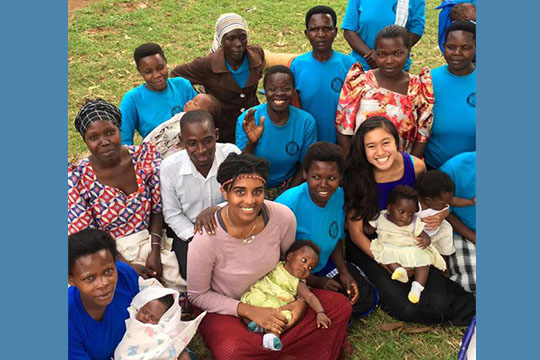
Lessons from Uganda
By Vivian Ho, ’17 (Human Biology)
The drums reverberate in the red dust. The women in the community groups sing to the beat of the drums with a rumble in their voices—a rumble that declares a sense of community, a rumble that states they are effecting change for the issues that matter to them. They are performing dramas about pregnancy, nutrition, and hygiene. The crowd, with over 500 people, is listening.
With the support of a Halper fellowship through the Haas Center for Public Service, I worked with Safe Mothers, Safe Babies (SAFE), a nonprofit organization aimed at reducing maternal mortality rates in eastern Uganda. My time in Uganda challenged my norms and made me evaluate new ones. It forced me to recognize how activism and seeking justice can be loving to the populations who desire to be heard, especially women. It gave me personal stories and examples of frameworks to life that are different from my own, and yet somehow they are not so different. It has given me an itch to recognize the status quo and not be settled in it.
When I left the U.S., I expected simply to do a public health internship in Uganda. By the end of my time there, I realized I had found a family. In the words of a village member, “You have roots here in Uganda. You’re a Musoga.”
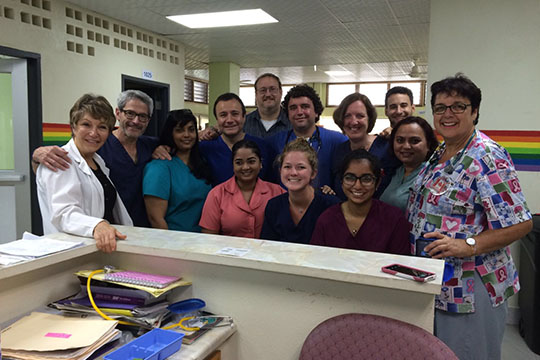
He’s tumor free
By Riasoya Jodah, ’19 (Undeclared)
Three days after my fellowship ended, I got a text message from my former co-workers in our group chat that I couldn’t bring myself to leave just yet. It was a picture of a smiling boy swaddled in blankets with tubes resting beneath his nose. The caption read “He’s tumor free.”
Shawn is an eight year old indigenous boy who was admitted to pediatric surgical ward of the Georgetown Public Hospital Cooperation the day I started my Halper International Fellowship in Georgetown, Guyana. He came in with a near lethal snake bite, but my team also found a mass that turned out to be a Wilm’s Tumor in his kidney. Shawn, like many other patients that I worked with, lives in a remote village and arrived via medivac to the hospital. It’s quite possible that his tumor would have remained undiscovered if he hadn’t been forced to seek care due to the snake bite.
His struggle is familiar to the thousands of indigenous people without access to health care in Guyana. After a grueling 10 weeks of biopsies and treatments, Shawn underwent surgery where the tumor was entirely removed. He’s back home now; a healthy boy with his family. I receive an updated picture whenever he visits the hospital for a follow-up, and it serves as a reminder of the service I owe to the people of my home.
Ria is a 2016-17 fellowships peer advisor.
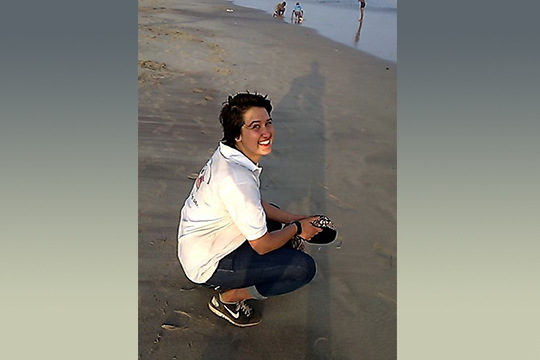
Unfinished business

By Mina Shah, ’16 (Comparative Literature)
When I received an African Service Fellowship to work with the West Africa AIDS Foundation (WAAF), I was ecstatic. However, while preparing for the fellowship I began to study ethical theory relating to serving in communities with which the server is unfamiliar. I became terrified that by engaging in this service endeavor, I’d be doing a morally reprehensible thing. Furthermore, a week before I left, my grandmother passed away, sending me spiraling into grief for the entire time I was working at WAAF. Then, just as I felt like I was getting adjusted to my surroundings, Stanford pulled out all students in West Africa due to the Ebola outbreak.
The combination of wanting to conduct my service with WAAF as ethically as possible and feeling as though I’d left unfinished business in Accra made me want more than anything to go back to Ghana and WAAF this past summer. Using the entire academic year to prep, I was better able to serve the organization as a more respectful outsider. As a result, I became motivated to apply for the Master’s Program in African Studies here. So, cliché as it sounds, this experience has changed my life positively in ways that I never could have anticipated.
Mina is a 2016-17 fellowships peer advisor.
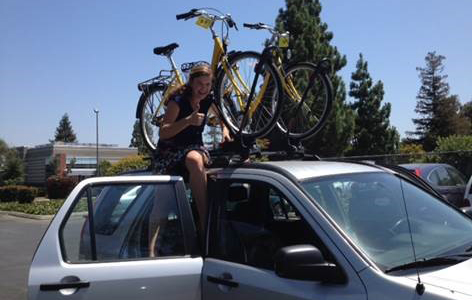
Helping refugees rebuild their lives
By Kirsten Willer, ’17 (International Relations)
“Kirsten! I got the job!” Ahmed said excitedly as he walked into the offices of the International Rescue Committee (IRC) on my last day of work this past summer. I had frequently worked with him in the IRC’s Matching Grant employment program, and he had been recently hired as an electrician. I had helped him refine his resume, attend a job fair, submit his job application, and draft follow-up letters, so I had been by his side through the entire process of finding this job.
Through the Spirituality, Service, and Social Change Fellowship, I interned at the IRC in San Jose. The IRC provides essential services to refugees and asylees in the first 90 days after their arrival in the United States. Throughout the summer, I got to offer my support to many people, like Ahmed, as they rebuilt their lives in the United States.
Although finishing my fellowship was bittersweet, I feel incredibly grateful for the experience. Now I’m considering attending law school so that I can help demystify the legal aspects and challenges of the immigration and resettlement process for other refugees, asylees, and immigrants. Working at the IRC was an invaluable experience, in terms of both learning about the immigration system and witnessing the resilience of the human spirit.
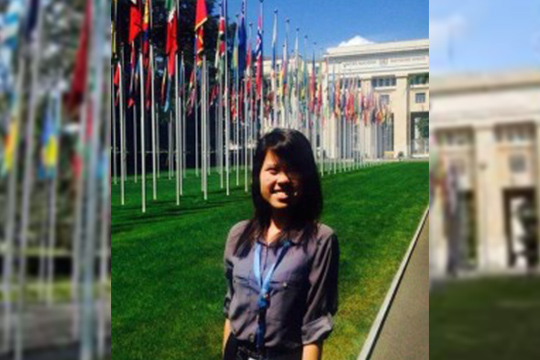
Strategy for humanitarian aid
By Monica Chan, ’17 (Mechanical Engineering; International Relations (minor))
Time: June 2015. Place: Geneva, Switzerland.
Finally, I had arrived for my long-awaited summer internship with the Shelter and Settlement Section of the United Nations High Commissioner for Refugees (UNHCR).
During my 9-week internship, I was taken on board several projects. The most interesting project I was involved in used the UNHCR’s newly developed “Master Plan” concept. The “Master Plan” aims to promote holistic and comprehensive design and development of settlements. My specific project was to develop a plot of land (1500 hectares) in Kenya not only to build a new refugee camp, but also to work towards a more sustainable solution for interaction between the refugee and host communities. I started the first steps by conducting research on the incoming refugee population, tracing out land contours, and studying the county government’s Integrated Development Plan. Drawing multiple drafts of camp designs was a long and iterative process, but essential to developing a settlement that ensures the safety and dignity of refugees.
This summer internship allowed me to merge my three passions – engineering, global affairs and public service. Working with such a qualified, dedicated team at an international humanitarian aid organization has definitely motivated me to educate people on and off campus about refugee crises and to be a more strategic advocate for human rights.
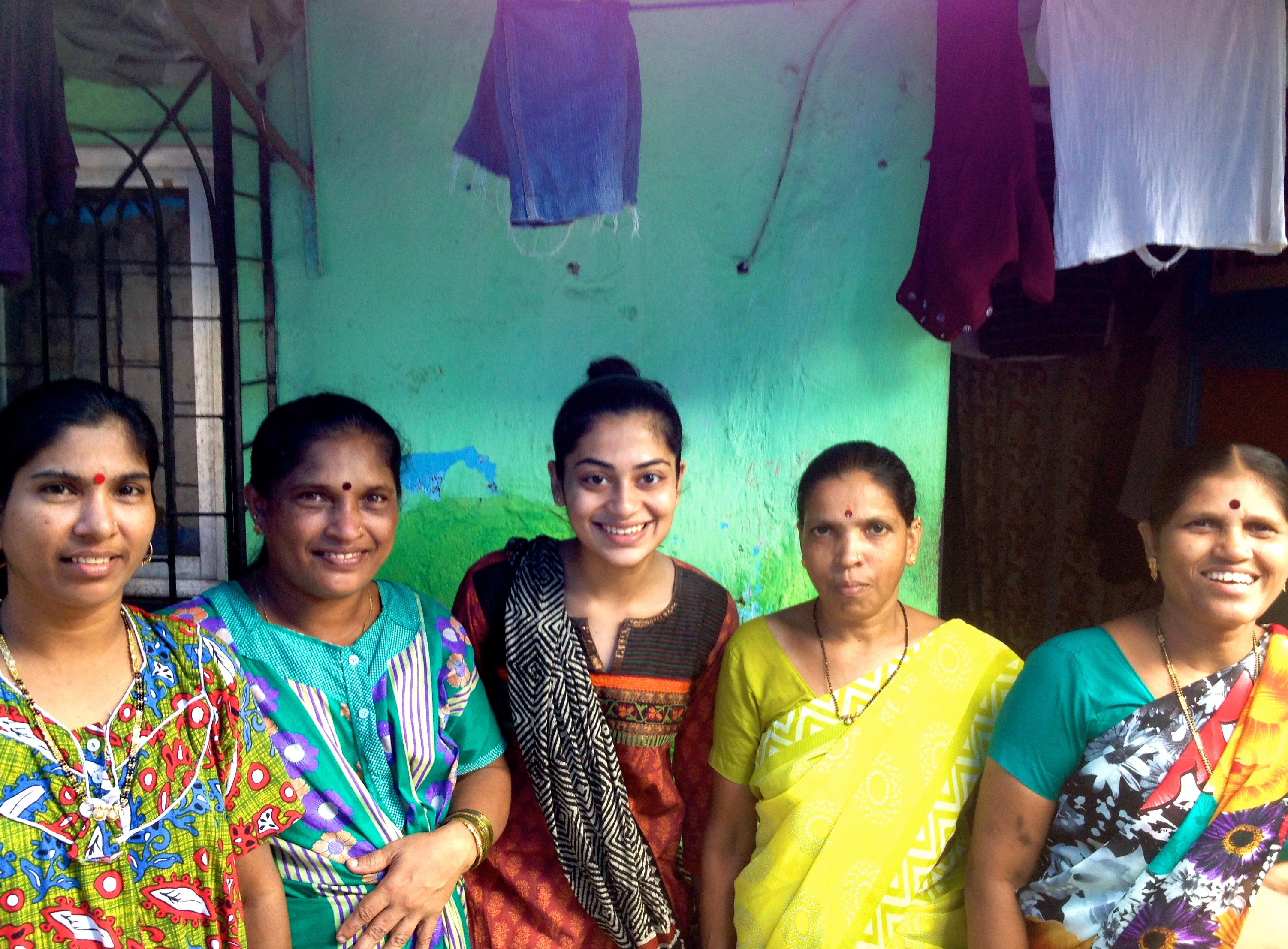
From heart to heart and hut to hut
By Apurva Khedagi, ’15 (Human Biology)
During my Haas Center fellowship I worked alongside the NGO Sneha in the Kandivali slums, leading group meetings on preventable diseases. Together with the Kandivali women, we developed simple solutions.
As I helped women make hairpins and played with their babies, I grew close to them. Due to these relationships, my fellowship’s goals were easier to accomplish. We discussed ways to take utmost advantage of their current health care resources and devised measures they could implement to address preventable diseases. We displayed those innovative, simple solutions on posters across the slum alleys. I saw that if given the chance, all individuals possess power to take responsibility for their own health.
My relationships with the women and my drive to remedy malnutrition led me to return to Mumbai this year to tackle this issue through a research intervention project, the UAR Senior Synthesis. Now, as I pursue a career in medicine, I cannot wait to continue on this learning journey.
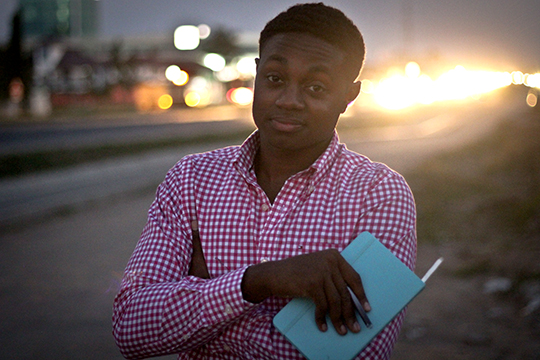
UNICEF Tanzania reflections
By Brandon Hill, ’16 (Public Policy)
This past summer, I served as an intern for UNICEF Tanzania as a Haas Center African Service Fellow. I helped to build a national social media campaign around violence against children called Ukuti Ukuti, filmed a United Nations documentary on early childhood education in Zanzibar, and assessed the impact of UNICEF programs in inland villages in Tanzania. Perhaps my most fulfilling experience was designing and launching UNICEF Tanzania’s first-ever Girl’s Empowerment Forum, partnering with other UN organizations to gather 50 primary school student-leaders to ask live questions of a panel of national policy makers and NGO leaders.
I had the opportunity to talk about development barriers with the leader of the opposition party in Tanzania, Professor Ibrahim Lipumba, Ph.D. ’83, who was also a co-founder of Stanford’s African Student Association in the 1980s. I also heard harrowing stories of leadership from Peter Temu, former economic advisor to the president of Tanzania, and listened to Romana, a young student, tell me how she single-handedly shifted gender norms in her rural village in the mountains of Iringa.
Having imbibed the Swahili culture and worked among the some of the most dynamic people I have ever met, I am energized about the future of East Africa and how I can play a role in its rise.
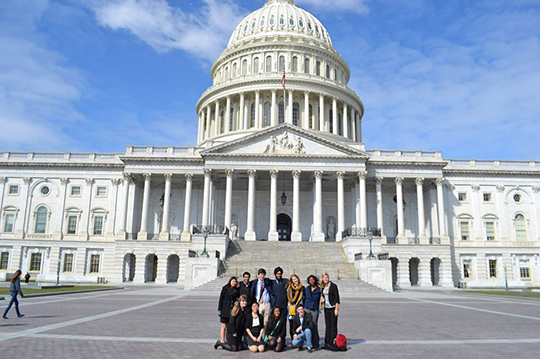
Lobbying for human rights
By Jared Naimark, ’14 (Earth Systems)
In 2013, I led an Alternative Spring Break (ASB) trip to Washington D.C. After teaching a 10-week course to 12 fellow undergraduates on international human rights advocacy with my co-leader Emily Witt, we set off for a week-long exploration of our nation’s capital. We met with eight different nonprofit advocacy organizations and one government agency and engaged their staff in provocative discussions centered around the question: How can we get more people to care about international human rights and take action without oversimplifying the causes of or solutions to violent conflict?
With these discussions in mind, our group set off for Capitol Hill. We were nervous and tired, and most of us had never been in a lobby meeting before. But we put on our best clothes, reviewed our notes, and stepped into the congressional offices with confidence. We asked for the US to cut military aid to Rwanda which had been supporting abusive insurgent groups in Eastern Congo, and also asked for human rights benchmarks to be met before the US resumed military to military relations with Burma’s armed forces. After these lobby meetings, our trip was over, but our group’s commitment to transforming human rights advocacy was just beginning. Empowered by the notion that elected officials would actually care what a group of college students thought about human rights, our group was inspired to take what we learned on our trip and apply it to a diverse range of public service causes and pathways.
